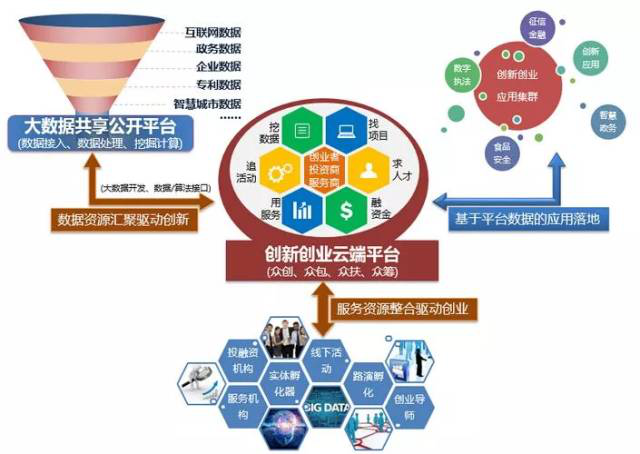Introduction: In August 2015, the State Council issued the "Action Outline for Promoting Big Data Development", which for the first time clearly proposed building a strong data nation; in October 2015, the Fifth Plenary Session of the 18th CPC Central Committee proposed "implementing the national big data strategy", elevating big data to a national strategy. Subsequently, national government departments, scientific research institutes, large internet enterprises, and traditional industrial enterprises have continuously released strategic blue papers to plan for the future.
The Magic of Big Data
In today's rapidly developing society, we are in the torrent of big data. With the advancements of the internet, the Internet of Things, and other technologies, communication among people is becoming increasingly close, and life is becoming more convenient. Big data is a product of this high-tech era. For the average person, big data may seem "out of reach"; it is not a tangible entity, but it is indeed applied in our lives, promoting technological advancement and social change.
*Big Data refers to a collection of data that cannot be captured, managed, and processed within a certain time frame using conventional software tools. It is a vast, high-growth, and diverse information asset that requires new processing models to enhance decision-making, insight, and process optimization capabilities. -- Baidu Encyclopedia
According to the national big data blue paper, we will analyze and interpret China’s ten major development trends and prospects in big data. (Take note, students!)
Interpretation of the Ten Trends●Below
(6) Industrial Big Data Provides Strong Support for Achieving a Manufacturing Power
With the continuous deepening and development of industrial big data innovative applications, our country will usher in optimization and upgrading driven by data throughout the entire lifecycle and industrial chain. The infrastructure construction of industrial big data and its integration with other industrial platforms will become more complete, inevitably exploring new models for the networked, digital, and intelligent development of manufacturing.
*Industrial big data refers to all data generated around typical intelligent manufacturing models in the industrial field, encompassing various stages of the entire product life cycle, from customer demand to sales, orders, planning, research and development, design, process, manufacturing, procurement, supply, inventory, shipping, delivery, after-sales service, operations, scrapping or remanufacturing, as well as related technologies and applications, centered around product data, greatly extending the scope of traditional industrial data, while also including technologies and applications related to industrial big data. -- Baidu Encyclopedia
The industrial big data we discuss is not entirely equivalent to the data flowing in enterprise information software. According to industry consensus, there are three main sources: the first category is business data related to enterprise operations, which comes from the category of enterprise informationization, including enterprise resource planning (ERP), product lifecycle management (PLM), supply chain management (SCM), customer relationship management (CRM), and environmental management systems (EMS). This category represents the traditional data assets of industrial enterprises.
The second category is interconnected machine and equipment data, which mainly refers to operational data concerning the operational status, environmental parameters, etc. during the industrial production process of equipment, materials, and product processing, transmitted in real-time through MES systems. Currently, with the extensive application of intelligent equipment, this category of data is growing the fastest.
The third category is external data of enterprises, which includes data on the usage and operational status of industrial products after sale, along with a large amount of data from customers, suppliers, the internet, etc. -- Big Data Observation Network
Industrial big data has a set of rules for data recording. Its characteristics are accurate information, high quality, capability to reflect production relationships, low fragmentation rate, high timeliness, and direct value significance of data. In contrast, the common characteristics of big data refer to large storage volumes, complex data structures, low effective value, and a plethora of useless information.

(7) Continuous Attention to Big Data Security Issues
While big data provides convenience for the dissemination of information in cyberspace, it also poses challenges to traditional security measures and existing administrative supervision means. In the future, the construction of a big data security legal system will further improve, and the information technology industry that is secure and controllable will experience explosive growth, with continuous innovations of security technologies, products, and services.
Let’s take a look at the following data:
◆ In 2021, the losses caused by cybercrime are expected to reach $600 billion annually.
◆ From 2017 to 2021, cybersecurity spending is expected to exceed $1 trillion.
◆ In 2021, cybersecurity job vacancies are projected to reach 3.5 million, but the number of cybercrimes will surpass this figure by more than three times.
◆ In 2020, the number of potential attack points will reach 4 billion.
◆ Global losses from ransomware are expected to exceed $5 billion in 2017.
(Data Source: Sohu.com)
Currently, news about personal information breaches is rampant in the country,
with incidents such as the suicide of a female university student named Xu Yuyü after being scammed and the leakage of compromising photos related to students' loan activities garnering widespread attention from internet users. The issue of information leakage on the internet is quite prominent in our country, with many incidents of internal personnel selling user information in banks, logistics, delivery, and third-party financial platforms, turning the trading of user privacy information into a gray industry.
Additionally, there are often illegal elements on the internet fabricating and deliberately spreading false information, maliciously distorting facts, defaming others, and harming corporate images. Worse still, some release a large amount of rhetoric attacking and vilifying our government, judicial authorities, and the current political system, distorting facts through intentional planning and involvement in sensitive case hype.
The issue of big data security is extremely prominent. Alongside the development of big data, it is crucial to strictly control data security and combat cybercrime.

(8) Legal Issues of Data Ownership Urgently Need Resolutions
The pace of advancing legislation and standards related to big data in our country is expected to accelerate. By continuously deepening research into key issues such as data rights, data management, data trading, and data security, we can gradually improve a legal system related to big data centered around a "Data Rights Law".
The internet connects the world, enabling global users to share data resources. However, processes related to the generation, opening, usage, trading, protection, ownership, and governance of these resources can lead to disputes.
During the circulation of data resources, it is necessary to clarify the ownership issues of data users, defining the obligations and responsibilities of producers and users in various management processes, and safeguarding the legitimate rights and interests of all parties.
Looking to the future, issues of data openness and ownership will be resolved with the implementation and improvement of laws.

(9) Big Data Trading Will Further Improve the Ecosystem
With the huge market demand for data trading and the establishment and improvement of rights belonging to data, value assessment, and trading norms, a data trading market exceeding trillions in scale is anticipated to emerge. Among the existing trading platform configurations, multi-level characteristics will present, with the future forming a three-dimensional market pattern of 1-2 national-level and 8-10 regional-level entities.
The potential of China’s data trading market is enormous. If utilized fully, it would be revolutionary for internet development and enterprise growth. Through data linking or trading, we can build smart cities, and the conveniences in transportation, telecommunications, healthcare, and government affairs will significantly improve; enterprises can continuously refine their services and meet user needs through data analysis, aligning accurately with customers to launch products or services.

(10) The Rise of Data Science
With deeper explorations of disciplines and the continual inquiry into innovative theories of big data such as block data and granular data, a theoretical system for the big data discipline will be established.
Leading domestic internet companies such as Baidu, Alibaba, Tencent, and Huawei have developed independently owned data platforms, large framework systems, and a series of big data solutions. The development experience of large enterprises has become a standard circulating within the industry, forming relevant industries, and giving rise to the establishment of relevant concepts and theories, thereby advancing the development of big data business in China.
Currently, the theoretical system related to big data is not yet mature; industry standards, and concept definitions lack uniformity, and many scholars have proposed new theoretical explorations such as block data, granular data, and global data.
Big data technology is expected to play a greater role in the exploration of scientific foundations during its rich and improving process. Additionally, the application of data science across various disciplines will continuously establish and perfect itself, hopefully achieving consistency among various disciplines at the data level based on this.

Recommended Reading
"Big Data Blue Book: China Big Data Development Report No. 1", compiled by the Big Data Strategic Key Laboratory and published by Social Sciences Academic Press. As the first "Big Data Blue Book" nationwide, it analyzes and assesses the development of big data from the perspectives of systems, technologies, industries, and disciplinary construction, and proposes ten new trends in the development of big data in China.


文章评论